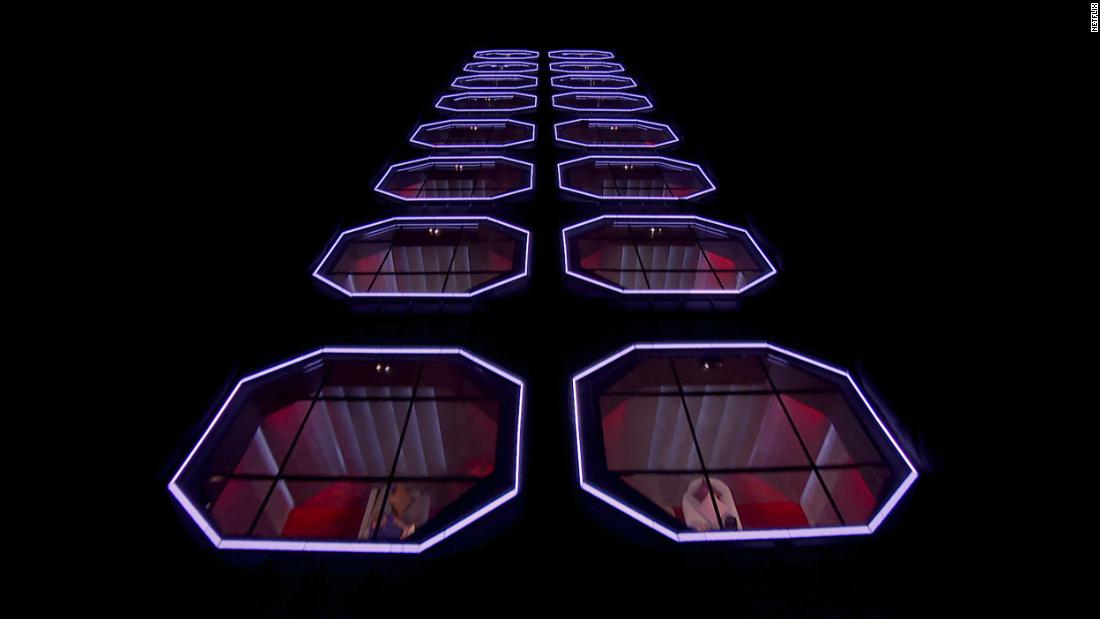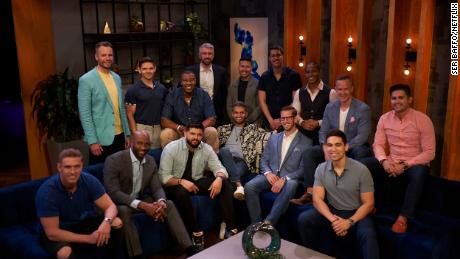
“Someone matched with me then very quickly messaged me saying, you know, ‘I have a boyfriend, but I think you’d be really great for the show I’m casting for, are you interested?'” Hartwell recalls in an interview with CNN.
While he can’t say for certain the casting agent was on there looking for potential contestants, he does claim that most of the cast of Season 2 of Netflix’s “Love Is Blind,” the show he was cast on, didn’t actually apply on their own.
“They were reached out to one way or another on social media,” he says fellow cast members told him.
“Love Is Blind,” which was nominated for an Emmy Award this week for outstanding structured reality show, features 15 men and 15 women who are placed in individual isolation rooms or “pods,” where they are paired with a contestant in a separate room. They then have conversations to see if they can spark a connection with someone — and eventually get engaged– without actually seeing them.
Hartwell says he agreed to appear on the show after checking the agent’s Instagram account and their job.
“I’ve actually, I’ve never really been that interested in reality TV. It just, you know, was never that entertaining for me,” Hartwell says. “But I have a personal philosophy of seeking out new experiences, challenging myself, doing stuff that seems scary — and this kind of fit all of the criteria there. I decided to throw my hat in the ring. I never actually thought I would be cast.”
Hartwell’s experience on the second season of “Love Is Blind” began in April of 2021, when producers booked him on an early morning flight from Chicago to Los Angeles.
“When filming started, the flight was very, very early for [a few of] us and I believe that was to separate the men and the women, so that we wouldn’t see each other,” he says, adding that things turned “uncomfortable” almost “immediately.”
“We were constantly told not to talk to each other, not to talk about things while we were waiting for people to finish getting their bags and get into the shuttle to be taken to orientation,” he says, as some of the show’s participants were transported at the same time.
Contestants were reminded not to communicate with each other, Hartwell says, even cordially.
After an introductory speech from producers, Hartwell says contestants’ belongings were searched and their cell phones, wallets and IDs were confiscated.
“They had told us they were going to take our cell phones, so that was expected, but taking our wallets, our passports, any identifying information, that was very unexpected,” he says, adding that “rubbed me the wrong way.”
“They went through all of our baggage — if you’ve ever seen a military movie, a boot camp, where they just go through the recruit’s baggage, but that’s exactly what it was like. They went through every single one of our personal belongings, presumably to make sure we didn’t have some sort of contraband.”
After that, Hartwell says producers shipped everyone to their separate hotel rooms.
“We were basically locked in the room,” he says. “The very first thing they did was isolate us in our rooms for about 24 hours straight.”
Hartwell alleges that snacks and water were so infrequent, they were forced to wait hours for fresh water if they were thirsty.
On day two, the cast took media photos and videos.
“Most of the activity was punctuated by large stretches of waiting,” Hartwell says.
Once production started, Hartwell claims he tried to fight the effects of sleep deprivation after long hours filming under bright lights. On set and back in his hotel, Hartwell says he could not access food and water, but alcohol was available — and even encouraged on an empty stomach.
In June, Hartwell filed a lawsuit against Netflix, Kinetic Content and Delirium TV, the production company and casting company behind the show, for a number of labor-law violations, including “inhumane working conditions” and inadequate pay for the amount of hours cast members worked.
Netflix has not responded to CNN’s request for comment.
In a statement to CNN in response to Hartwell’s complaint, Kinetic Content and Delirium TV wrote: “Mr. Hartwell’s involvement in Season 2 of ‘Love is Blind’ lasted less than one week. Unfortunately, for Mr. Hartwell, his journey ended early after he failed to develop a significant connection with any other participant. While we will not speculate as to his motives for filing the lawsuit, there is absolutely no merit to Mr. Hartwell’s allegations, and we will vigorously defend against his claims.”
Hartwell’s attorney, Chantal Payton of Payton Employment Law in Los Angeles, tells CNN the lack of adequate food and isolation “made cast members hungry for social connections and altered their emotions and decision-making.”
Hartwell’s proposed class-action suit is on behalf of all participants in “Love Is Blind” and other non-scripted productions created by the defendants over the past four years. He is seeking unpaid wages, financial compensation for missed meal breaks, monetary damages for unfair business practices and civil penalties for labor code violations.
Kinetic Content also produces “The Ultimatum: Marry or Move On” and “Married at First Sight,” both of which stream on Netflix.
Season 3 of “Love Is Blind” will stream on Netflix later this year.
For Hartwell, he says he hopes to change the practices of some reality shows going forward.
“It’s a matter of justice and it’s not about the money for me. It’s not about exposure,” Hartwell says. “I strongly feel that these practices are wrong and they need to change. And the reason why I am making these efforts with this lawsuit is I’m hoping this becomes a catalyst for these changes, so that future reality TV cast members don’t have to go through this.”
